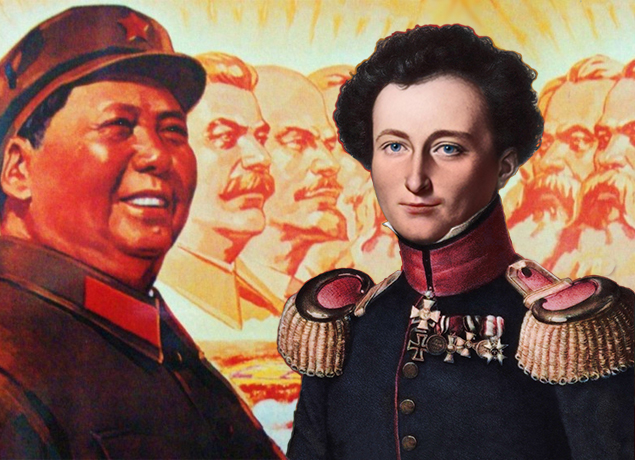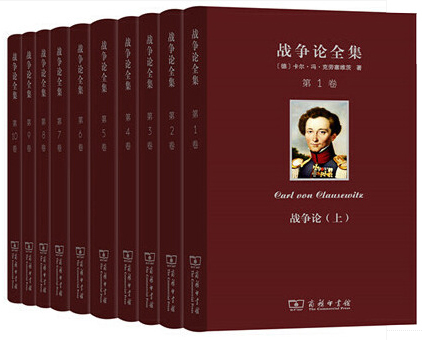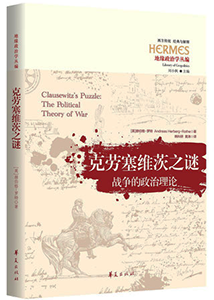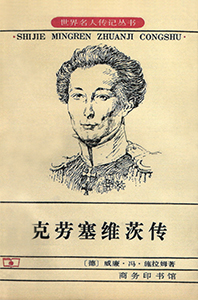Clausewitz Bibliography in Chinese
There has long been considerable interest in Clausewitz in China. Both Mao Zedong and Chiang Kaishek discussed his ideas—Mao actually taught seminars on Clausewitz and Chiang sponsored a translation. Their interest may have been sparked by the German advisors working in China in the 1930s, some of whom were of high rank and influence in Germany itself, including Hans von Seeckt. Mao's interest in Clausewitz was long the subject of great skepticism, with many arguing that any knowledge he might have had probably came from Lenin's comments. However, the publication of some of Mao's personal papers in the 1980s demonstrated his direct involvement with Vom Kriege (in Chinese translations from Japanese, French, and possibly German texts. Mao's Clausewitz seminars occurred in 1938, just as Mao was promulgating his essay "On Protracted War" (a major subject in Clausewitz's work).
Mao's presentation of the latter concept appears to have been highly influenced by Vom Kriege's arguments (which is quite different from saying he got the basic idea from Clausewitz). This was amply demonstrated in Zhang Yuanlin's Ph.D dissertation (U. Mannheim, Germany, 1995) and several articlesby him in German by (see our German bibliography), which were examined in detail by the French/Belgian writer T. Derbent (see our French bibliography).
Consequently, there is a very extensive Chinese literature on Clausewitz, owing to the influence of German military advisors to both the Communist and Kuomintang forces in the 1930s and, of course, to Mao Zedong's interest and influence. Note that Clausewitz's entire 10-volume collected works has recently been translated into Chinese, whereas only a few volumes other that those containing Vom Kriege have ever been translated into English. Since we lack expertise in the Chinese language, we've listed only Chinese sources that have been described in English or, in some cases, German or French. In addition, we have posted images of a number of Chinese works and a few links to books available via Chinese bookstores. We would dearly love to enlist a capable Chinese-language bibliographer. If you qualify and are interested in serving in that role, please contact us.
Search the DangDang.com Chinese bookstore for Carl von Clausewitz (卡尔·冯·克劳塞维茨).
Listed on Amazon.com in the USA.
[德]卡尔·冯·克劳塞维茨:《战争论全集》(陈川译),十卷本,北京:商务印书馆,2019年。
— ISBN-13 978-7100172219
From the German: Carl von Clausewitz, The Complete Works, translated by Chen Chuan, 10 volumes, Beijing: The Commercial Press, 2019.
Pinyin: [De]kaer feng Kelaosaiweici, Zhanzhenglun Quanji,Cheng Chuan yi, shijuanben, Beijing: Shangwu Yinshuguan, 2019 nian. A recently retired PLA senior colonel, Chen Chuan (陈川), who had served as a military attaché in the Chinese embassies in Switzerland and Germany and attended some senior military schools in Germany, published this 10-volume translation of Clausewitz's collected works in 2019.
Derbent, T. [Thierry, pseud.] Clausewitz et la guerre populaire, Aden, 2004, Bruxelles, 190 p. (Suivi de deux textes inédits Notes sur Clausewitz de Lénine et Conférences sur la petite guerre de Clausewitz). ISBN 2930402024. [More info from T. Derbent. And see this image and text.]
Débat: "Clausewitz ou Mao Zedong?" [see https://lesmaterialistes.com/contre-informations/]
It appears "Les Materialistes" has subsumed the old "Contre-Informations." There are a great many additional references to material concerning Mao listed on this page.
See also: https://lesmaterialistes.com/pensee-guide-coeur-maoisme
[Derbent, T.] "Clausewitz ou Mao Zedong?"
Par le Parti Communiste Marxiste-Léniniste-Maoïste (France), publié dans Révolution n°4 (décembre 2008), originally linked on the disappeared site "Contre-Information," l'organe du PCMLM, but archived by LesMaterialistes.com. Cet article est une critique de Clausewitz et la guerre populaire, aussi par Derbent. (See also Spanish translation.)
éléments de réponse au journal "Révolution"
Par T. Derbent (janvier 2009), mise en lien sur "Contre-information", le site du PCMLM.
"Le rôle de la France napoléonienne dans la genèse du nazisme (pour en finir avec Clausewitz)"
Par le PCMLM, publié dans "Révolution" n°10," (avril 2009).
Toujours en réponse au journal "Révolution"... (pour en finir avec la transformation de Clausewitz en bouc émissaire anti-révisionniste), Par T. Derbent (juin 2009).
See also T. Derbent's own website, https://tderbent.org/. [This site disappeared from the web sometime during the Covid pandemic. We have taken the liberty of reposting it to the ClausewitzStudies.org server—with, unfortunately, many broken links. See also Derbent's Clausewitz bibliography.
Derbent, T. "Clausewitz, Mao et le maoïsme." Complément à Clausewitz et la guerre populaire paru dans la revue Clarté rouge n°4, Bruxelles, mai 2013, pp. 13-29.
The article in PDF from T. Derbent's own site.
A Spanish translation.
See also: Derbent, "Clausewitz dans l'héritage maoïste." [Un complément inédit de Clausewitz et la guerre populaire.]
Chinese interest in Clausewitz remains strong. See Yu Tiejun's essay "The Western Master and Bible of War: Clausewitz and His On War in China," pp.43-60 in the Clausewitz Gesellschaft's book, Reiner Pommerin, ed., Clausewitz Goes Global: Carl von Clausewitz in the 21st Century, commemorating the 50th Anniversary of the Clausewitz Society (Berlin: Carola Hartmann Miles Verlag, 2011).
We have extracted the following bibliographical references from Profess Yu Tiejun's notes:
General comments on the bibliography of Clausewitz in China:
In China, most of the writings on Clausewitz have been done by military scholars or scholars who used to work in the military. There are a few exceptions like Shi Yinhong at Beijing and Ni Lexiong at Shanghai.
In the new edition of China Military Encyclopedia, Clausewitz and his On War are present in the sub-field of Military Philosophy, Foreign Military Figures, Foreign Military Works, Mao Zedong’s Military Thought, and Military Scientific Research, etc. See the related volumes published by Zhongguo Dabaike Quanshu Chubanshe [Encyclopedia of China Publishing House] in 2006-2007.
Within the author’s reading limitation, the earliest and also the only literature review on foreign studies of Clausewitz and On War is Zhang Yuanlin, “Guoneiwai dui Kelaosaiweici jiqi Junshi Sixiang Yanjiu Zongshu” [A Comprehensive Review of Foreign Studies on Clausewitz and his Military Thought], in Wu Qiong and Xia Zhengnan, eds., Lun Kelaosaiweici Zhanzhenglun [On Clausewitz’s On War], 1999, pp. 320-334.
Many important research subjects have been absent in China. In contrast, a Japanese scholar has done a much more comprehensive and up-dated historiography of Clausewitz. See Yasuyuki Kawamura, “Historiography: For the Study on Clausewitz,” The Journal of Strategic Studies (Japan), No. 1, 2003, pp. 111-171.
In Western military science, Jomini is usually regarded as standing on the same foot with Clausewitz. But Jomini’s position and influence in China is obviously less prominent than Clausewitz. Jomini’s Summary of the Art of War was not fully translated into Chinese until 1986, and the related literature is far smaller than that on Clausewitz. Professor Yu used “Kelaosaiweici (Clausewitz)” and “Ruomini (Jomini)” as keywords to search the CNKI electronic journal data-base, and got a result of 447 entries related to “Clausewitz” and 10 entries related to “Jomini” during the period from 1980 to 2010 (searched on January 7, 2011).
There are Four Biographies of Clausewitz available in Chinese:
Two are translated works written by German authors, two are written by Chinese scholars.
Fulanci Fabian [Franz Fabian], Kelaosaiweici Zhuan [Clausewitz], The Foreign Military Research Department of AMS tran., Beijing: Zhongguo Duiwai Fanyi Chunban Gongsi [China Foreign Translation and Publishing Company], 1984.
Weilian feng Shilamu [Wilhelm von Schramm], Kelaosaiweici Zhuan [Clausewitz], Wang Qingyu et al., trans., Beijing: Shangwu Yinshuguan [The Commercial Press], 1984.
Xue Guoan, Kelaosaiweici Zhuan [A Biography of Clausewitz], Shijiazhuang: Hebei Renmin Chubanshe [Hebei People’s Press], 1997.
Xia Zhengnan, Kelaosaiweici [Clausewitz], Kunming: Yunnan Jiaoyu Chubanshe [Yunnan Educational Press], 2008.
Chinese editions of Vom Kriege/On War:
According to Xia Zhengnan’s study Jiedu Zhanzhenglun [Interpreting On War] (2nd edition), Beijing: Jiefangjun Chubanshe [The PLA Press], 2005, pp. 680-682, as of 2005 there were 33 Chinese versions of On War.
These include:
Dazhan Xueli [Theory of Great War], Lujun Jiaoyu Yanjiushe Yiyin [Translated and Published by the Army Education and Research Society], 1911.
Gelusaiweizhi [Clausewitz], Dazhan Xueli [Theory of the Great War], tras. Qu Shouti, Beijing: Beijing Wuxueguan Shuju [Beijing Military Science House Publisher], 1915. The translator, Qu Shouti, had participated in the translation of the first Chinese version of On War. He was a graduate of Beiyang Army Crash School, and then became an instructor at Baoding Army College, two of the earliest and most prominent military colleges in modern China.
Kelaosaiweici [Clausewitz], Dazhan Xueli [Theory of the Great War] (vol.1), Huang Huanwen ed. and tran., Guilin: Guofang Shudian [National Defense Bookstore], 1941.
Kelaosaiweici [Clausewitz], Dazhan Xueli (or Zhanzheng Lun) [Theory of the Great War, or On War], Huang Huanwen ed. and tran., Shanghai: Shangwu Yinshuguan [The Commercial Press], 1944.
Kelaosaiweici [Clausewitz]], Zhanzhenglun [On War] ( translated by PLA Academy of Military Sciences), Beijing: PLA General Staff’s Publishing Bureau, 1964-1965.
Kelaosaiweici [Clausewitz], Zhanzhenglun (abridged)[On War], Beijing: Zhongguo Renmin Jiefangjun Junshi Kexueyuan [PLA Academy of Military Sciences], 1977.
For a more detailed examination of the evolution of Chinese versions of On War, see Xia Zhengnan, “Kelaosaiweici Zhanzhenglun zai Zhongguo de Liuchuan” [The Spread of Clausewitz’s On War in China] Zhongguo Junshi Kexue [China Military Science], No. 5, 2004.
See also: Song Zi, “Yeshuai Zhidao Women Fanyi Zhanzhenglun” [Marshal Ye Instructed Us to Translate On War], Zhongguo Shehui Kexuebao [China Social Science Newspaper], January 6, 2011. At that time, Marshal Ye Jianying was the President of the AMS.
Interpretating Vom Kriege:
Among the most notable works are:
Xia Zhengnan, Jiedu Zhanzhenglun [Interpreting On War], esp. pp. 680-693. Two editions. A good summary of the literature on the study of Clausewitz.
Xia Zhengnan, Kelaosaiweici Zhanzheng Zhexue Yanjiu [Study of Clausewitz’s War Philosophical Thoughts], Beijing: Jiefangjun Chubanshe [The PLA Press], 1989;
Wu Qiong, Zhangzhenglun Quanshi [Interpreting On War], Beijing: Huawen Press, 2001.
Wu Qiong and Xia Zhengnan, eds., Lun Kelaosaiweici Zhanzhenglun [On Clausewitz’s On War], Shanghai: Shanghai Jiaoyu Chubanshe [Sahnghai Education Press], 1999.
See esp. three papers in Wu and Xia, eds., Lun Kelaosaiweici Zhanzhenglun [On Clausewitz’s On War], pp. 52-83.
Kong Lingtong, et al, “Fangyu shi ‘Yizhong Jiaoqiang de Zuozhan Xingshi’” [The Defensive Is ‘a Stronger Form of Warfare’], in Wu Qiong and Xia Zhengnan, eds., Lun Kelaosaiweici Zhanzhenglun [On Clausewitz’s On War], pp. 219-235.
Guo Weitao, “Fangyu shi Yizhong Jiaoqiang de Zuozhan Xingshi Ma?” [Is the Defensive a Stronger Form of Warfare?], in Wu and Xia, eds., Lun Kelaosaiweici Zhanzhenglun [On Clausewitz’s On War], pp. 223-225.
Su Enze, “Buyao Wangle Kelaosaiweici” [Don’t Forget Clausewitz], Zhongguo Huofangbao [China National Defense Newspaper], August 14, 2007, p. 6.
Jiny Yinan, “Shenme shi Minzu de Zhimingshang” [What is a Nation’s Deadly Damage], Jiefangjun Bao [Jiefangjun Daily], February 9, 2010.
Li Yong, “‘Zhangzheng Miwu’ Bing Wei Sanqu” [“Fog of War” has not Disappeared Yet], Zhongguo Guofangbao [China’s National Defense Newspaper], July 18, 2002.
Xu Xing, Wude Renge [The Personality of Military Virtue], Junshi Lishi Yanjiu [Studies of Military History], No. 3 (2003), pp. 144-152.
Xia Zhengnan, Kelaosaiweici Zhanzheng Zhexue Yanjiu [Study of Clausewitz’s War Philosophical Thoughts].
Ni Lexiong, “Dui Kelaosaiweici Junshi Xueshuo de Jidian Kanfa” [Several Points on Clausewitz’s Military Doctrine], Xueshu Jie [Academics in China], No. 2 (2002), pp. 155-162.
Clausewitz compared with Sun Tzu:
On January 7, 2011, Professor Yu Tiejun used “Kelaosaiweici (Clausewitz) and Sun Zi (Sun Tzu)” as keywords to search the CNKI journal article database, and found 52 related entries from 1980-2010.
The Art of War was written in the 5th century BC while On War was published in 1832; The Art of War has only over 5,000 Chinese characters or fewer than 40 pages in English translation, while On War is close to 600 pages long—over 690,000 Chinese Characters in translation.
Xue Guoan, Sunzi Bingfa yu Zhanzhenglun Bijiao Yanjiu [monograph, The Art of War and On War: A Comparative Study], Beijing: Junshi Kexue Chubanshe [Military Science Press], 2003.
Zhai Dongsheng and Shi Yinhong, “Dui Sunzi de Kelaosaiweicishi de Pipan” [A Clausewitzian Criticism of Sun Tzu], Zhanglue yu Guanli [Strategy and Management], No. 5 (2003).
Zhai Dongsheng and Shi Yinhong, “Dui Sunzi de Kelaosaiweicishi de Pipan” [A Clausewitzian Criticism of Sun Tzu].
Xue Guoan, Sunzi Bingfa yu Zhanzhenglun Bijiao Yanjiu [The Art of War and On War: A Comparative Study].
Clausewitz and Mao:
Li Jijun, “Mao Zedong Junshi Sixiang de Tedian he Lishi Diwei” [The Characteristics and Historical Position of Mao Zedong’s Military Thought], in Li Jijun, Junshi Lilun, yu Zhanzheng Shijian [Military Theory and War Practices], Beijing: Junshi Kexue Chubanshe [Military Science Press], 1994.
Wu Qiong, “Mao Zedong Junshi Sixiang yu Zhanzhenglun zhong de ‘Gairanxing’ Lilun” [Mao Zedong’s Military Thought and the Law of Probability in On War], Nanjing Zhengzhi Xueyuan Xuebao [Journal of Nanjing College of Politics], No. 4 (1987), pp. 56-62.
Selected Military Writings of Mao Tse-tung, Beijing: Foreign Languages Press, 1967.
Xia Zhengnan, “Mao Zedong: Junshi Bianzhengfa Sixiang zhi Jidachengzhe” [Mao Zedong: A Master of Military Dialectic Thought], MaoZedong Sixiang Yanjiu [Studies of Mao Zedong Thought], No. 1 (1996).
Yang Xin, “Shilun Mao Zedong Junshi Zhanlue Siwei Chansheng de Kexuejichu” [On the Scientific Foundations of the Birth of Mao Zedong’s Military Thought], Junshi Lishi Yanjiu [Military History Studies], No. 2 (2002).
Additional Sources:
General Guo Huaruo was a prominent military theorist and strategist of PLA and a renowned expert on Sun Zi. In December 1937 when Mao Zedong wrote to him, he was helping Mao Zedong in Yan’an to write on strategy against the Japanese aggression. General Guo was the vice president of the AMS from 1973 to 1982.
He Sijing,was a famous Marxist intellectual who was a graduate of the University of Tokyo and an expert on German philosophy and theory of law. He died in 1968 during the Cultural Revolution of China.
Niu Xianzhong, Zhangluejia [The Strategist], Nanning: Guangxi Shifan Daxue Chubanshe [Guangxi Normal University Press].
Makesi Engesi Junshi Wenji [Military Writings of Marx and Engels], Vol. 1 and Vol 5, Beijing: Zhanshi Chubanshe [Soldier’s Press], 1981.
Liening Junshi Wenji [Military Writings of Lenin], Beijing: Zhanshi Chubanshe [Soldier’s Press], 1981.
Liening [Lenin], Kelaosaiweici Zhanzhenglun Yishu Zhailu he Pizhu [Excerpts and Annotation of Clausewitz’s On War], Beijing: Renmin Chubanshe [People’s Press], 1978.
Xia Zhengnan (1955- ), Jiedu Zhanzhenglun ("Commentary on On War"), edition: Di 1 ban (Beijing: Jie fang jun chu ban she: Xin hua shu dian fa xing, 2003). LC# 2003393891, ISBN 7506543303.
Xue Guo'an, Sunzi bing fa" yu "Zhan zheng lun" bi jiao yan jiu (also in pinyin: Sunzi Bingfa yu Zhanzhenglun bijiao yanjiu, edition: Beijing di 1 ban (Beijing Shi: Jun shi ke xue chu ban she, 2003). LC# 2004367573, ISBN 7801376188.
Zhang, Yuanlin. "Die chinesischen Ausgaben des Werkes `Vom Kriege' von Carl von Clausewitz," in: Österreichische Militärische Zeitschrift 28 (1990), S.229-230.
Zhang Yuan-lin. "Mao Zedong und Carl von Clausewitz: Theorien des Krieges, Beziehung, Darstellung und Vergleich." Ph.D. Dissertation, University of Mannheim, 1995. Table of Contents (.pdf).
Zhang Yuanlin. "Mao Zedongs Bezugnahme auf Clausewitz." Archiv für Kulturgeschichte Volume 81: Issue 2, published online 1 Dec 1999. https://doi.org/10.7788/akg.1999.81.2.443
Above: Andreas Herberg-Rothe's book Clausewitz's Puzzle: The Political Theory of War (Oxford: Oxford University Press, 2007, ISBN 0199202699) has now been published in Chinese: 副标题: 战争的政治理论 (Huaxia Publishing House, 2020). ISBN: 9787508099026. [Also available from Amazon.com.)
KELAOSAIWEICI ZHUAN
(Wilhelm Ritter von Schramm, Clausewitz: Leben und Werke)
ISBN 7-100-01788-2
531 Seiten







